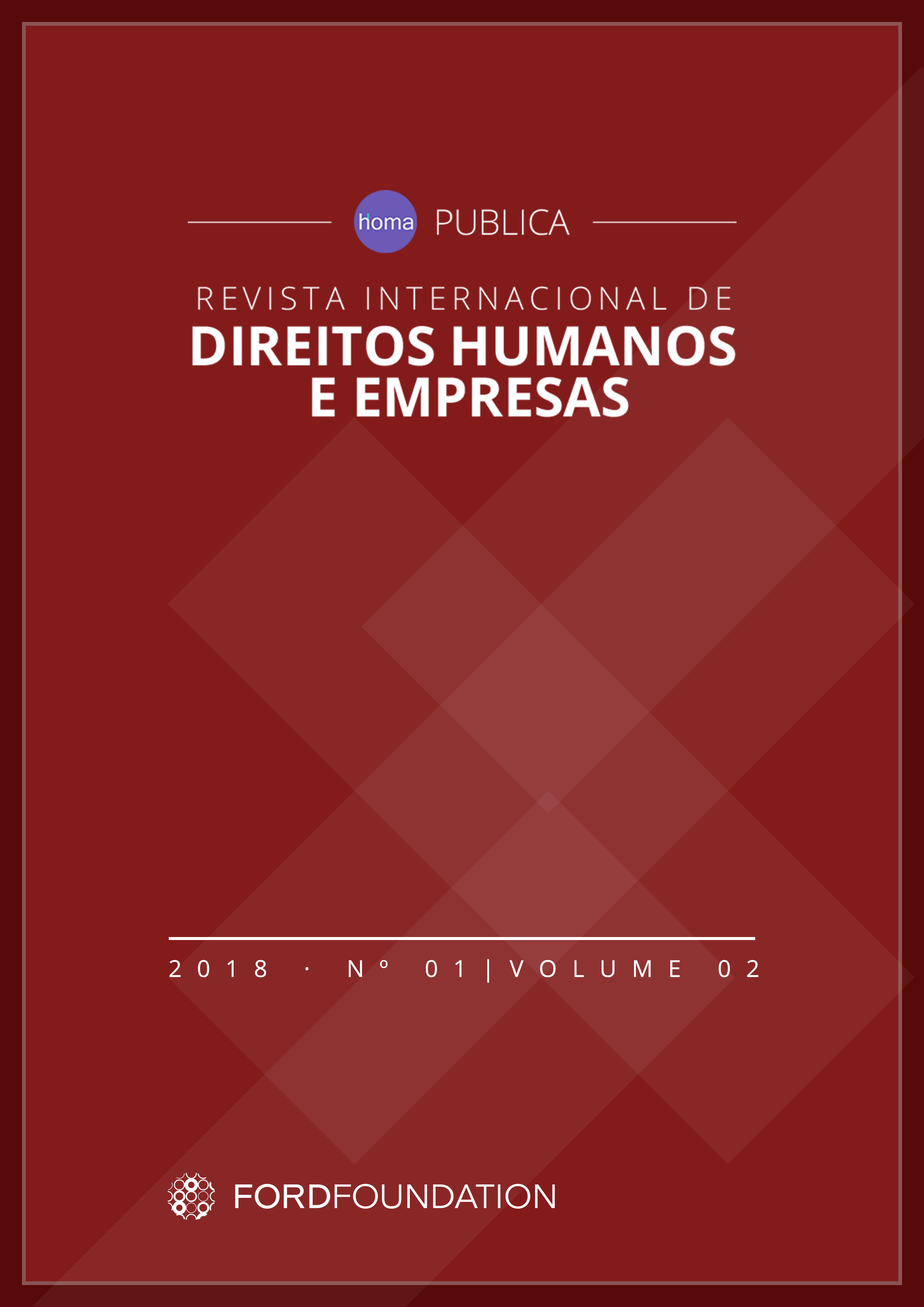Dever de vigilância, direitos humanos e empresas transnacionais: uma análise dos diferentes modelos de luta contra a impunidade
Publicado 2018-01-31
Palavras-chave
- Due diligence,
- Prevenção,
- Dever de vigilância,
- Textil,
- Direitos Humanos
- Empresas Transnacionais ...Mais
Como Citar
Resumo
O texto parte da afirmação da necessidade de desenvolver normas internacionalmente vinculativas sobre empresas transnacionais e direitos humanos que ponham fim à impunidade de que gozam as primeiras quando, directamente ou ao longo dos vários elos da sua cadeia de abastecimento, provocam violações desses direitos, bem como de assegurar a reparação das vítimas. O setor têxtil, fundamentalmente nos elos das cadeias de valor localizados em diferentes países da Ásia, é um dos que apresenta um maior índice de violações dos direitos humanos em geral e dos direitos laborais em particular. Por este motivo, o artigo utiliza o exemplo deste setor para realçar tanto o impacto destas violações como a ineficácia dos mecanismos atualmente em vigor para as evitar. Esta declaração é feita no artigo juntamente com o reconhecimento da existência de quadros normativos já em vigor, como o direito francês, e iniciativas em curso, como a Iniciativa Sanchez-Candeltey, que representam um progresso no estabelecimento de normas vinculativas que sujeitam as ações das empresas transnacionais ao respeito pelos Direitos Humanos. Contudo, e esta é a tese fundamental do artigo, estas iniciativas continuam a ser parciais para o controle de entidades como as TNCs, que devido à sua atividade transnacional escapam facilmente ao controle estabelecido nos quadros normativos estatais ou regionais. Neste sentido, o artigo argumenta que o elemento essencial para alcançar o fim da impunidade e avançar para a erradicação de fenômenos como a escravidão moderna é a adoção de um instrumento internacional juridicamente vinculante, como o que está sendo negociado no âmbito da Resolução 26/9.
Downloads
Referências
APARICIO TOVAR, J.; VALDÉS DE LA VEGA, B. (Dir.) La Responsabilidad Social de las Empresas en España: concepto, actores e instrumentos. Albacete: Bomarzo, 2011.
AUGENSTEIN, Daniel; UNIV. DE EDIMBURGO .Study of the Legal Framework on Human Rights and the Environment Applicable to European Enterprises Operating Outside the European Union. 2009. Disponible en http://ec.europa.eu/growth/tools-databases/newsroom/cf/itemdetail.cfm?item_id=3334
BARRET, E. The doctrine of Forum non Conveniens. 35 Cal. L. Rev. 380, 1947.
BERRÓN, G. Economic Power, Democracy and Human Rights. A New International Debate on Human Rights and Corporations. Sur Journal. No.20, 2014.
CLEAN CLOTHES CAMPAIGN. European Union and the Bangladesh garment industry: The case for a trade investigation. 2017.
CLEAN CLOTHES CAMPAIGN. Four years after Rana Plaza: Steps in the right direction but a lot remains to be done. 2017. Disponible en https://cleanclothes.org/news/2017/04/21/four-years-after-rana-plaza
CLEAN CLOTHES CAMPAIGN. Who pays for our clothing from Lidl and KiK?, A study into the impact of buying practices of the discounters Lidl and KiK in Bangladesh and the precarisation of working conditions in German retailing. 2008. Disponible en https://cleanclothes.org/resources/national-cccs/lidl-kik-eng.pdf/view
CUZACQ, N. Commentaire des propositions de loi relatives au devoir de vigilance des sociétés mères et des entreprises donneuses d'ordre. Revue de droit du travail, Nº. 4, 2014, págs. 265-266.
DEVA, S. Regulating Corporate Human Rights Violations. Humanizing Business. New York: Routledge, 2012.
ESTEVE, J.E. La estrecha interdependencia entre la criminalidad de las empresas transnacionales y las violaciones al derecho internacional de los derechos humanos y del medio ambiente: lecciones del caso Bhopal. Revista electrónica de estudios internacionales (REEI), Nº. 32, 2016
ESTEVE, J.E. Los Principios Rectores sobre las empresas transnacionales y los derechos humanos en el marco de las Naciones Unidas para «proteger, respetar y remediar»: ¿hacia la responsabilidad de las corporaciones o la complacencia institucional? Anuario Español de derecho internacional, Nº27, 2011.
GARCÍA, M. A. Acuerdos Globales Multilaterales, una nueva expresión del derecho transnacional del trabajo. RDS, Nº70, 2015. El texto del acuerdo puede encontrarse en: http://bangladeshaccord.org/wp-content/uploads/the_accord.pdf.
GUAMÁN, A. La cooperación reguladora.
GUAMÁN, A. TTIP: el asalto de las multinacionales contra la democracia. Akal, 2015
GUAMÁN, A.; CONESA, J. El CETA al descubierto: las consecuencias del Tratado entre la UE y Canadá sobre los derechos sociales. Albacete: Bomarzo, 2016.
GUAMÁN, A.; JIMENEZ, P. Los acuerdos comerciales como estrategia de dominación del capital. Las amenazas del CETA y del TTIP, editorial Pol·len, 2016.
HERNÁNDEZ, A. Accidentes aéreos y forum non conveniens. Algunas cuestiones en torno al asunto Honeywell en España. Cuadernos de Derecho Transnacional, Vol. 4, Nº 2, Ouctubre 2012.
NICOL, D. The constitutional protection of capitalism. Oxford: Hart Publishing, 2010.
OIT. Global Stimates for Modern Slavery, forced labour and forced marriage. 2017. Disponible en http://www.ilo.org/wcmsp5/groups/public/@dgreports/@dcomm/documents/publication/wcms_575479.pdf.
PRIETO, J.; ESPINOZA, G. A binding treaty on corporate responsibility: a global solution to address the problem of corporate impunity. Lessons learned from Aguinda vs Chevron. HOMA Publica: International Journal on Human Rigths and Business, Nº2, 2017.
PRINCE, P. Bhopal, Bougainville and OkTedi: Why Australia's Forum Non Conveniens Approach Is Better. 47 1CLQ, 1998.
REINECKE, J.; DONAGHEY, J. After Rana Plaza: Building coalitional power for labour rights between unions and (consumption-based) social movement organisations. Organization, 22, Nº. 5, 2015.
RODOTÀ, S. Códigos de conducta: entre hard y soft law, Real Pérez, A., (Coordinadora), Códigos de conducta y actividad económica, M. Pons, Madrid, 2010
SERVAIS, J.M. Algunas reflexiones más sobre una cuestión espinosa: la responsabilidad social de las empresas. Derecho PUCP, N. 64, 2010.
TERWINDT, C.; SAAGE-MAASS, M. Liability of Social Auditors in the Textile Industry. European Center for Consitutional and Social Rights. 2016.
ZHENJIE, H. Forum Non Conveniens: An Unjustified Doctrine. Netherlands International Law Review, Nº 48, 2001.
ZUBIZARRETA, Juan Hernández. Las empresas transnacionales frente a los derechos humanos. Historia de una asimetría normativa. Vitoria: Ed Egoa, 2009.

